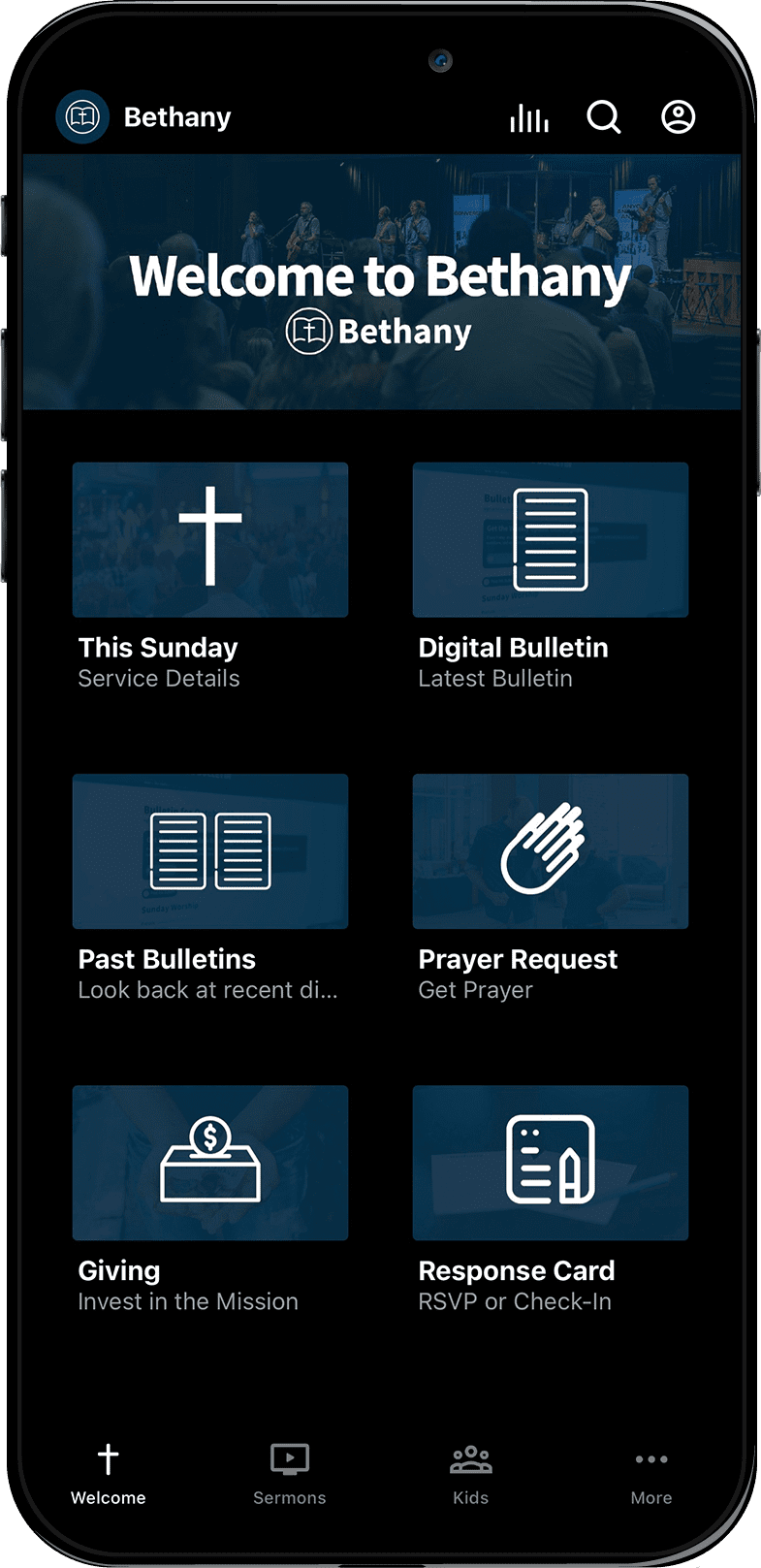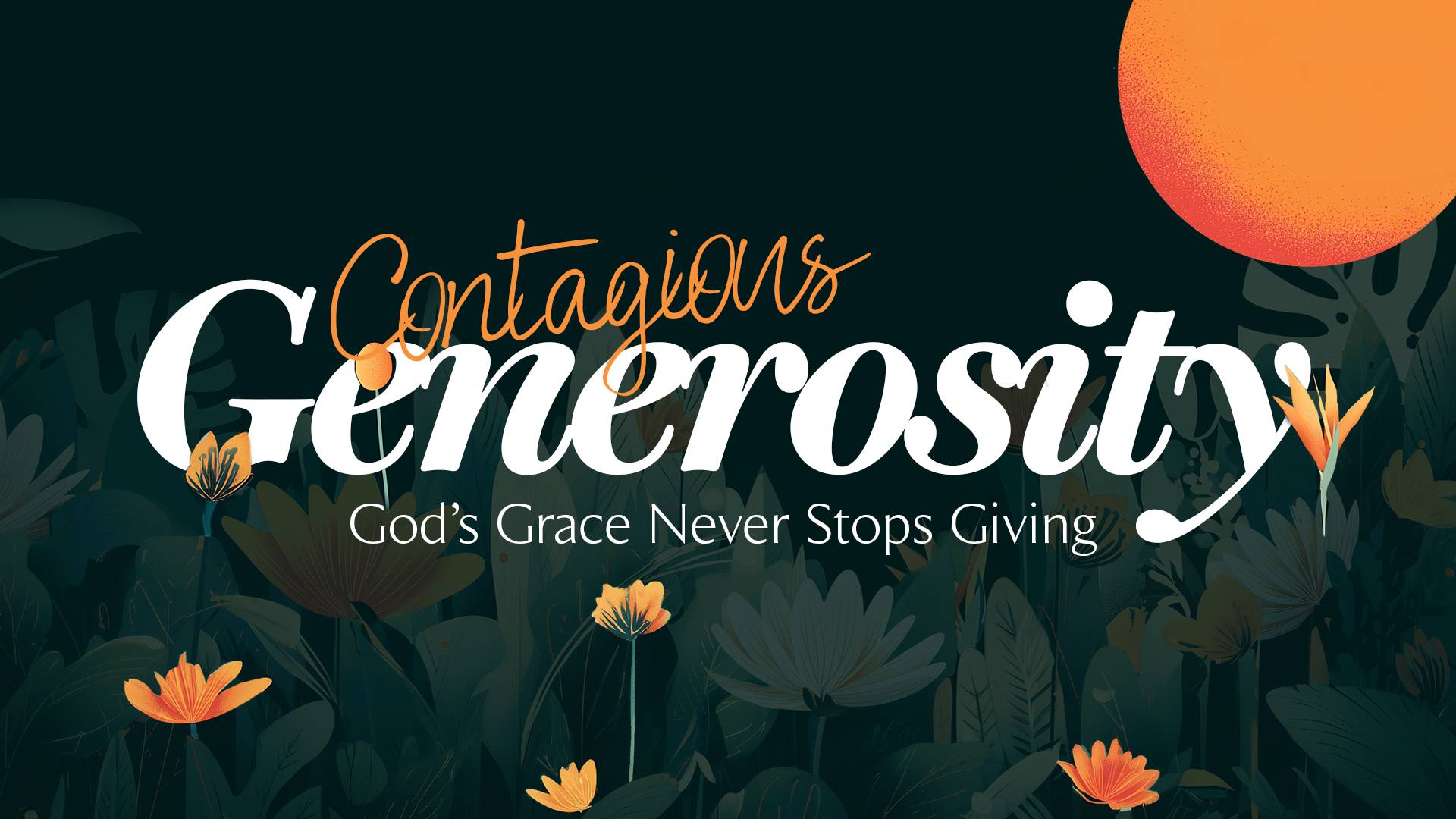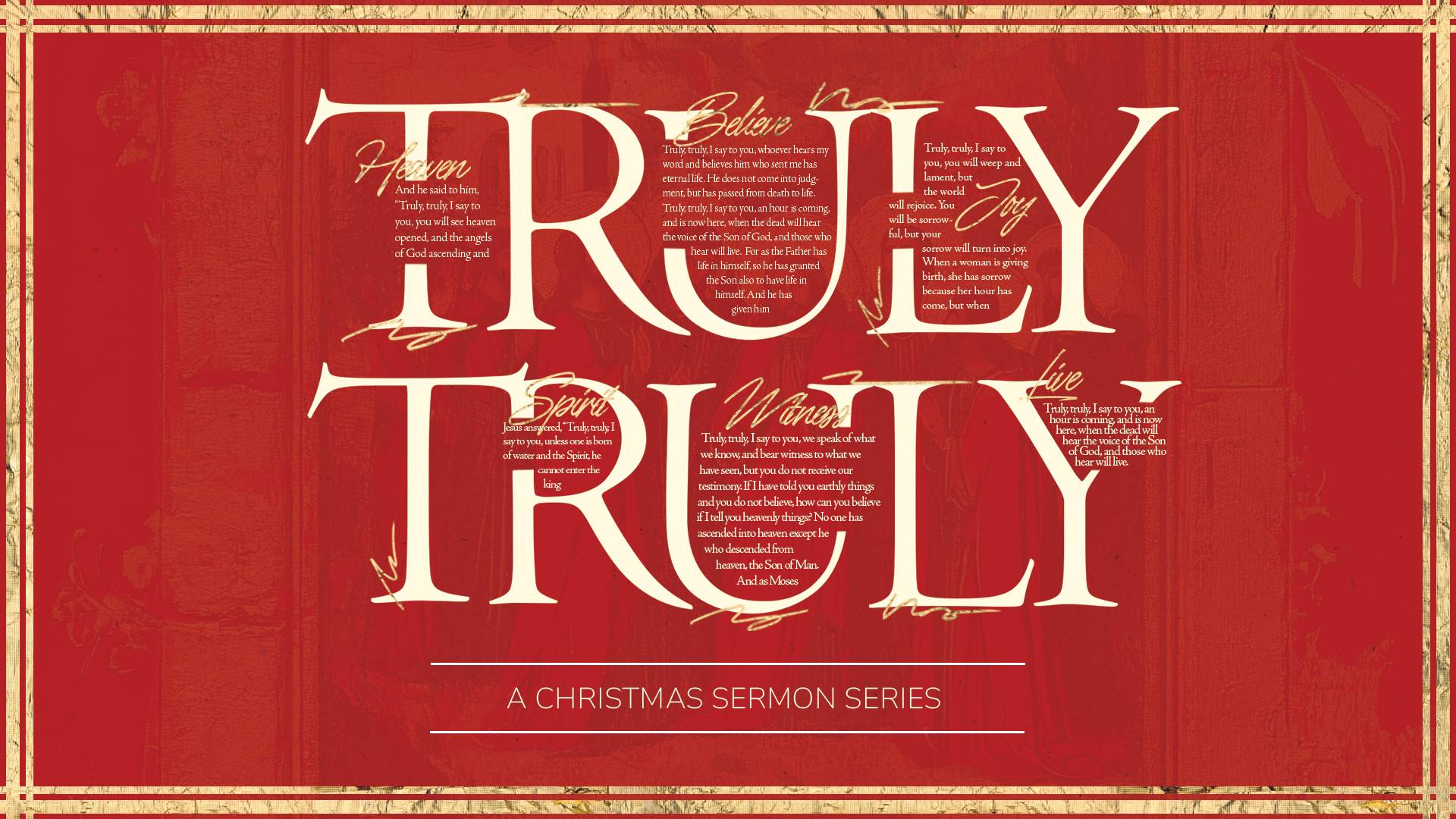In This Series
In Step: True Spirit-Filled Community
Galatians 5:13-26 (ESV)
August 15, 2021
Pastor Josh Beakley
We are in a series on The Helper, the Holy Spirit. As we follow Jesus together, He is the one who helps us to believe, to belong, and to become like Him. Today we’re going to talk about how we become like Christ both individually and corporately together as a church family, through the help of the Holy Spirit. We’ll look at Galatians chapter 5.
13 For you were called to freedom, brothers. Only do not use your freedom as an opportunity for the flesh, but through love serve one another. 14 For the whole law is fulfilled in one word: “You shall love your neighbor as yourself.” 15 But if you bite and devour one another, watch out that you are not consumed by one another.
16 But I say, walk by the Spirit, and you will not gratify the desires of the flesh. 17 For the desires of the flesh are against the Spirit, and the desires of the Spirit are against the flesh, for these are opposed to each other, to keep you from doing the things you want to do. 18 But if you are led by the Spirit, you are not under the law. 19 Now the works of the flesh are evident: sexual immorality, impurity, sensuality, 20 idolatry, sorcery, enmity, strife, jealousy, fits of anger, rivalries, dissensions, divisions, 21 envy, drunkenness, orgies, and things like these. I warn you, as I warned you before, that those who do such things will not inherit the kingdom of God. 22 But the fruit of the Spirit is love, joy, peace, patience, kindness, goodness, faithfulness, 23 gentleness, self-control; against such things there is no law. 24 And those who belong to Christ Jesus have crucified the flesh with its passions and desires.
25 If we live by the Spirit, let us also keep in step with the Spirit. 26 Let us not become conceited, provoking one another, envying one another.
It’s an amazing thing, when people come together in unity! My family and I were watching a bit of the Olympics and we were so impressed by some of the skill and the commitment required for team and synchronized sports. It’s incredible the number of and the time away from family and practices and hours that these athletes have to sacrifice. And they need to utterly trust their coach to have input on how they can stay together. Then the end result is just stunning. Another picture of that sort of unity is that of a marching band. Hundreds of musicians are working together in harmony as they follow those in charge and their lead. They’re weaving in and out of each other’s paths into this beautiful picture accompanied by these sweeping scores. It’s just an amazing thing, when people come together in unity! That’s true in specific ways, but it’s even more wonderful when it happens in everyday life in a broader and deeper way.
The word we use to capture that idea is one that has become so overused and overpromised it almost has lost its meaning. But even so, it remains an idea that we continue to long for and strive towards. It’s this idea of community. It’s a group of people who share something in common. We are part of a lot of communities. Maybe you’re part of an online community. There are various groups, a sports team in a school community, a neighborhood community. We’re part of all these. Many are based on superficial things we share in common. So they don’t strike us as particularly special or valuable. As the thing we share in common becomes a higher level of commitment and a deeper value to us, we value that community even more meaningfully.
But the message of Scripture would tell us that there is one kind of community that is more beautiful, more compelling. It’s more wonderful, more loving than any other kind of community. People who share something in common, who are moving in step toward a goal, who come together in what I’ll call true community, a sense of belonging to something so meaningful, it will last forever. That is the community of belonging to Jesus, of following Him together, of being a part of His family. It’s actually this kind of community that people are truly longing for, that God has designed us to long for. We’ve been made to want that. It seems more clear than ever after the last couple of years. I don’t know about you, but I’ve had many conversations with people who are discouraged, who are lonely, who feel disconnected, struggling to engage, who feel like they’ve slipped away, and not just here, but around the nation. As we traveled, we spoke to people that felt disconnected, that wanted to be a part of true community.
The thing about, not a superficial but a supernatural community is that it’s not something we can create. We don’t make it. We receive it. We enjoy it. We’re brought into it. But it’s not something we have formed. It’s lasting. It’s special. It’s precious. It’s a gift. This ultimate form of true community that is life-giving, that is loving, that is compelling, is found in Jesus, and it’s created and sustained by the Holy Spirit. He’s the one who helps us by bringing us into this community. He’s the one who forms us into this community.
This is the reason why Paul is so concerned. This special community and family of belonging to Christ and what it means to become like Christ is under attack. The Christians in this church in Galatia are struggling. So he writes a letter with incredibly strong language. They had initially received the good news of what Jesus has done. This Gospel message that Jesus was God come as a man, God the Son, who lived the perfect life, who fulfilled the requirements of the law, satisfied them. He gave His own life as a sacrifice and payment in our place for our sins and the punishment we deserved. He rose again, conquered death, and brings new life and offers it to all who trust in Him. It’s a gift. The Holy Spirit opened their eyes. They trusted and believed this precious message. They had been welcomed into this family that as Gentiles, they never would have dreamed of belonging to.
But people had come now teaching that involvement in this community had requirements. It had rules. What had begun by this gift of grace now had to be sustained and kept up by them. That to become like Christ, they had to follow these old Jewish rites of circumcision and more. In trying to maintain community, they were actually destroying it. It was getting so bad that it even came to the Apostle Peter. If you read back in Galatians, you’ll see that confrontation. It was breaking community apart. So Paul is very concerned and He is describing where true community comes from, what it looks like, how it lasts. In doing so, he gives us a clue as to what it is that makes Christian, that makes biblical, that makes what we’ll call Spirit-filled community so special and what makes it thrive.
We should ask, what’s the secret? What’s the formula? What is it that makes community so special? What makes it flourish? Don’t you want to know that? Don’t you want to have that kind of community here at Bethany? I know many of us do. We long for that. We want to be a part of it. It’s an area that we should really grab hold of with both hands as a church family. What makes community thrive? Sometimes, all the things we’re trying to do are just not working. We say, “Well maybe we need more money. Maybe we need more volunteers. That’s what it is. Maybe we need more plans or strategies. We need more talent.” It’s just on and on. Yet, these aren’t the things that make it thrive. Maybe we could use a little help.
Thankfully, we are going through a series on The Helper, the Holy Spirit. There, we find the answer is not so elusive as we might believe. True community comes down to keeping in step with God’s Spirit. It’s not inventing new steps or a new plan. No, we keep in step with the Spirit. True community thrives as we keep in step with God’s Spirit. Whether it’s the blessing of fellowship or whether it’s what you might call, vibrant worship, the joy of walking together in discipleship, all these things that we would long for actually come down and boil down to each of us in the church family keeping in step with the Holy Spirit.
So the question for us today is how? How do we do that? That’s what we’ll spend a few moments this morning exploring. How do we keep in step with the Holy Spirit for ourselves and together as a church family? We’ll draw out some lessons on community that can help us learn to do that. Hopefully by the end, we’ll have a sense of how we can enjoy that kind of Spirit-filled community. There are four lessons we’ll touch on.
The Danger God Points Out (15)
If we want to keep in step and enjoy true Spirit-filled community, the kind that comes from God, we’re going to have to watch out because selfishness destroys it. You can see that in verses 13-15 as Paul describes the Christian life, this community, this brotherhood, this family that has been set free from those regulations and self-made community. He paints this picture of a loving design that God calls them into, as well as the looming danger that it will face. He says
13 For you were called to freedom, brothers.
This is a gift that God has given and now you can live free, but there is a warning.
Only do not use your freedom as an opportunity for the flesh, but through love serve one another. 14 For the whole law is fulfilled in one word: “You shall love your neighbor as yourself.”
There had been this teaching that had come and that had seduced some of these believers, that Jesus is not enough to save them or to sanctify or change them. They need to follow more than just Jesus. They need to rely on rules and regulations like circumcision. “This is how I belong to the community of God. This is how I become like God.” This is the heresy Paul denounced as passionately as he could. “No, that is wrong!” He cried out again and again that to be Christian is to be free from the burden of the law. But he wants to make sure that we understand this freedom rightly because it is freedom from this system of rituals and a system that they couldn’t satisfy.
But his opponents could have had an easy comeback. “Paul, you’re over there talking about freedom.” They could accuse him of being against morality. “You’re against doing what’s right. You don’t care about doing what’s right.” Paul said, no, that’s not what freedom is. The aim of the law was always about love, and now Jesus sets us free to live it out truly from the heart. We’re now free not to sin, but we’re free from sin. Paul is saying this good news of freedom is an opportunity not to serve ourselves or indulge, but an opportunity to serve others, to give.
The word picture is this idea of using a free and open territory. Don’t let it set up a military base camp or an operation center in your life, as a campaign for indulgence. Don’t let freedom be this way that you now have a base of operations to just do whatever you want, freedom that is used as a cloak or cover-up for sin. That is what many false teachers of the Gospel will advance. You will see that and we’re warned of that in books like Peter and Jude. Peter says
1 Peter 2:16 Live as people who are free, not using your freedom as a cover-up for evil, but living as servants of God.
It’s an interesting picture of being free, and yet, a servant. He says in 2 Peter,
2 Peter 2:19 They promise them freedom, but they themselves are slaves of corruption. For whatever overcomes a person, to that he is enslaved.
Jude 4 For certain people have crept in unnoticed who long ago were designated for this condemnation, ungodly people, who pervert the grace of our God into sensuality and deny our only Master and Lord, Jesus Christ.
They pervert this grace and freedom and in doing so, live sinfully and deny that God is truly the Master and that our freedom is to serve Him. Paul says, “No, don’t do that.” Gospel freedom is freedom from this rigid law-keeping and freedom unto love-giving that fulfills the law truly. We’re no longer slaves to sin, but to God. True freedom is, you could say, love bound. Paul is talking about this special love of God and succumbing to selfishness is not freedom. It’s actually slavery in Paul’s book. To be a Christian is to be free, but not to sin, but to serve. So here is the freedom that God enables by His Spirit. It’s almost like the freedom to fly. We didn’t have that freedom before. Now we have wings and we can love the way that God calls us to. We’re not free to, as the world would say, love ourselves, follow our hearts, pursue our dreams, do what we want without concern to the cost of others. The world would advocate that and stir that. Yet, we see that’s what destroys true community. It’s scary how quickly we forget that word of wisdom that was once said. “Any man wrapped up in himself makes a very small parcel.” It’s a really sad picture of freedom. It’s ironic in a culture obsessed with liberation and yet consumed by addiction. Enslavement to the flesh is not true freedom.
When we talk about the flesh, we don’t just mean our body, but we mean all that man is capable of outside of God’s intervention. We mean all of who we are in our fallen nature, our desires that are corrupted and tainted by sin. Paul acknowledges that freedom is designed by God to be used to love others in service, but there is a danger that it may be seized by our flesh to be used selfishly. Verse 15 explains it. He says
15 But if you bite and devour one another, watch out that you are not consumed by one another.
It’s a danger he points out. Anytime God says, “Watch out,” we would do well to listen. There is a danger of using freedom for selfish ends. Unrestrained selfishness is the danger that we’re to avoid. The danger of selfishness destroys community. You can see the picture he’s giving is a sort of grim picture; those three graphic words, bite, devour, consumed.
Do you ever walk into a restaurant or grocery store? You know those tanks they have with the lobsters swimming around? What do they have on the lobster’s claws? Those rubber bands. I’ve read the reason why they have the rubber bands is that if they get those out, those lobsters will start to consume each other. They recognize these lobsters will go after each other. I’ve read about baby sharks who will devour siblings while still in their mother’s womb.
For, I think, 30 years, there was a tradition at Disney World that had this tradition of releasing pigeons at shows. It was sort of this big flamboyance at the occasion of a wedding or a show. But a couple decades ago, they decided to stop because there were these red-tailed hawks that realized they could enjoy a free meal at the same time every day. They said, “Well, we’re not going to keep doing that.” Any good zoo keeper knows you have to be careful about what animals you put in cages because they just might eat each other.
This is a picture of wild animals in a deadly struggle of appetites. In verse 15, Paul uses that to warn us of what selfishness does. It destroys community in the way that God has designed it. If we want to keep in step with the Spirit and enjoy, we have to learn that selfishness destroys community. We’re given some thoughts that can motivate us to watch out. When it comes to the kind of selfishness we should avoid, we’re told what it looks like and where it leads. You can see what it looks like.
The form it takes is what I’ll call predation or being a predator. It’s where hunters stalk their prey. The form it takes is that of hunting, of biting, of devouring. You can almost see the fangs. We’re not unfamiliar with that feeling. We even use that phrase. Someone makes a “biting remark.” It’s where words carry venom. Our desires drive us to prey on others for our own benefit. We’re not just talking about personality differences. It can take many different forms. Just like there are all kinds of animals, there are some cobras that spit from a distance. There are some sharks that strike without warning. There are some vultures that loom on high. There are some parasites that just slowly devour from the inside. There are all these ways that animals would bite and devour and tools and methods.
In our various personalities, we have all forms of ways to manifest our selfishness. Some of us will just come out and say hurtful words right away. Others of us are able to connive and send text messages or post links. Some of us shout out loudly. Some of us just clam up and then use the silent treatment. We use all of these as weapons to hurt each other to get what we want. Has anyone seen evidence of that in the world in the last two years? In the last two days? In the last two hours? In the last two minutes? Quite possibly! The form it takes is predation. It’s where we have this thing we want and we’re after it. The effect that it has is destruction. This is where it leads. He says
15 …watch out that you are not consumed by one another.
This picture of self-destruction, where everything is destroyed and mutually consumed, that’s what selfishness does. It destroys community. That’s a danger God points out. Love is the foundation, the atmosphere, the climate of community. Selfishness, self-love, putting self first, destroys it in sort of unrestrained anarchy. It’s chaos that destroys liberty. Paul is an example of what it looks like to serve others. We can look at many passages. 1 Corinthians 9:19 sort of summarizes it. He says
1 Corinthians 9:19 For though I am free from all, I have made myself a servant to all,
His freedom has been shaped by love such that he is free to serve, to love. He’s just following the example of Jesus. In Luke 22, Jesus was with His disciples and this selfishness stuff is nothing new. His disciples were arguing over who was the greatest. It was destroying community, for sure. It was just a mess. Jesus said
Luke 22:25 And he said to them, “The kings of the Gentiles exercise lordship over them, and those in authority over them are called benefactors.
They draw from others what they want.
Luke 22:26 But not so with you. Rather, let the greatest among you become as the youngest, and the leader as one who serves.
He says, “I’m among you as one who serves.” Jesus descended into this world of chaos, this world where Romans 1 would describe where humans who are designed to be in the image of God are now exchanging that for a more animalistic image and fighting and consuming. Jesus shows a different way. He didn’t come to get community for Himself. He came to give, to create community. He does so by the Holy Spirit. Without His help, we’ll descend into selfishness and the danger is a destruction of community.
There are so many examples that you just take a moment and think about in your life, how selfishness shows. How does selfishness show in your life? If you think about it for a moment, it’s kind of hard to focus on that. You kind of start to drift towards seeing how selfishness shows in other people’s lives. That’s kind of easy. I think about my family. I know what selfishness the kids show or my spouse shows or my parents show or my boss shows or my coworkers. But then to just sort of sit and focus for a moment, how does selfishness manifest in my life? So often, we draw the circle around ourselves and think, “That doesn’t affect anyone. That’s just me.” We forget that when we look at others, we can say, “That affects me. That hurts me. That selfishness hurts me. That hurts the family. That hurts the church family.”
Selfishness, in all the different forms that it takes, it affects others. It brings about destruction of community. One of the great illusions in our lives of the past year of being isolated in lockdown is we start to think that our sin and selfishness is not impacting our church family. Selfishness destroys community. That’s a truth that we would do well to reflect on as a danger that we should avoid. So how are we to do that? What are we to do instead? The answer is simple, but simple doesn’t mean easy. It’s not easy at all because next, we see
The Difficulty God Describes (16-18)
True community is what we want. Selfishness destroys it. That’s the danger. But here’s the difficulty. It is anything but natural. On our own, we cannot do it. It’s anything but natural. To try to appreciate that difficulty, look at what God describes in verses 16-18. Look at the struggle that we face.
16 But I say, walk by the Spirit, and you will not gratify the desires of the flesh.
Here’s the difficulty.
17 For the desires of the flesh are against the Spirit, and the desires of the Spirit are against the flesh, for these are opposed to each other, to keep you from doing the things you want to do.
There is a struggle.
18 But if you are led by the Spirit, you are not under the law.
If you want to follow Jesus, it’s not going to happen automatically. It’s not an easy ride-the-wave, go-with-the-flow kind of thing. It doesn’t happen by accident. It’s not natural. It’s supernatural. True community with God and with one another and living and moving the way that God would have us is not natural. It’s supernatural.
One of the places that we were blessed to visit this summer was Yosemite. If you’ve ever been to Yosemite National Park, there are beautiful cliffs and you kind of go down in this valley. We were down there with the kids. It was very hot! It was 110 degrees or something like that. We were hiking and the kids were getting hot. There is this little river that runs through. It’s a crystal clear, cool river. They kept wanting to go into the water. So we go down and that river has a pretty strong current. I have a couple of kids. The eight year old was able to make it through decently. The six year old was making his way. But the four year old stood no chance. When we tried to go across that current, it was so strong that there was no way she could make it without being swept away. So what did she do? She reached up her hand. So I grabbed her hand and we’re walking. It’s strong for me. She is being swept away so much that her feet are sort of kicking every once in a while. But I wanted her to keep moving with us. I wanted her to experience it together. So I let her feet dance. If I had let go, she would have been gone. But together we were going and I was helping her across. If I had left her to herself, she would have been swept away.
When we think about community, the kind of growth and the sanctification or likeness of Jesus, the love that God knows as Father, Son and Holy Spirit that we are brought into, that kind of love that comes from God, becoming like and belonging to that kind of love doesn’t happen naturally. It’s a supernatural thing. It’s anything but natural. Take a look at this difficulty. You see where it takes place. The difficulty of community, the primary realm here is within. He describes that the problem we so often look and point at as out there, he points at in here.
16 But I say, walk by the Spirit, and you will not gratify the desires of the flesh.
You have a struggle of desire that is happening inside and you need the Helper, God’s Spirit, to change the way that you’re living. The difficulty takes place within. The war is not primarily external, but internal. Whatever happens on Facebook or in the church building or out on the road, it first and foremost happens in the heart. He says to walk by the Spirit.
Walking is a simple picture. It’s the habitual way of life. It’s just how you live. It’s a continuing, ongoing decision. He calls you to do it. It was and still is a slow way to get somewhere, and yet you make steady progress. Walking and moving in a direction, you’re eventually going to reach your destination and you’re actually going somewhere. It’s possible to walk in the wrong direction in the wrong way. We’re all moving, but the question is where we’re headed. So Paul said walk this way. Walk by the Spirit.
There is a contrast if we had time, and you can go back and listen to another message from Ephesians chapter 5, that passage where they’re talking about what it means to be filled by the Spirit. This idea is contrasted with being drunk with wine and being filled by the Spirit. This picture is being under the influence or under the control of the Spirit. Just like when someone is driving under the influence of alcohol and they’re out of control, here, we’re living or walking under the influence of the Spirit, under His control. So this idea of community that is Spirit-filled, of being filled with the Spirit, is much less like we’re coming to a force that is impersonal that we’re trying to control and use to our benefit, but rather, we’re coming and He is a Person who we are yielding ourselves under His control. So He is at work in us and through us and He speaks through His Word. His Word is the primary means of filling our mind so that we know what His will is and we yield to His control. Walking by the Spirit is living according to what God has spoken, what He desires us to do, His controlling influence in our lives. We’re saturated with His influence.
D.L. Moody was a famous evangelist traveling around. He was going one place and there was a person, I believe he was in England, and a person said, “Why do we need him? Does he have a monopoly on the Holy Spirit?” The story goes that another man said, “No, but the Holy Spirit has a monopoly on him.” That is being under the control of the Spirit to be used by God in such a way that we don’t gratify or serve the desires of our flesh. Now, the reason why this struggle is happening, the difficulty, this underlying reality, is the conflict.
17 For the desires of the flesh are against the Spirit, and the desires of the Spirit are against the flesh, for these are opposed to each other, to keep you from doing the things you want to do.
If you have time, it would be worth reading Romans chapter 7 and think about that struggle. But following Jesus and experiencing the blessing of community is anything but natural. The struggle here is one against our sinful human nature and the supernatural nature that God has brought us into. It’s this new nature that we received as we are united with Christ. So now, we have this situation where we’re struggling internally. Our natural nature, our fallen nature longs for sin and to gratify our sinful selfishness. Yet now, we’re transformed and we have the Spirit speaking against. There is an opposition and an internal struggle and a war, a difficulty. In this sense, Jesus describes that without God’s help, there is no choice towards what is right.
Nicodemus, one of the religious leaders there in John chapter 3, might say, “I was born this way. This is the natural thing.” Jesus said, “You have to be born again. There has to be a total transformation, something new.” This is the difficulty. The struggle that happens and how it stops, the only remedy is a rescue, a liberation of freedom to be empowered by the Holy Spirit. If you’re led by the Spirit, then you’re not under the law. You’re not under the dominating control or condemnation of the law. The Spirit, He leads you out.
Now, if Paul is saying we’re called to freedom and we’re to love each other, the opponents might have said, “If you take down the fences of these cages, the animals are just going to go loose and wild.” Paul says, “No, they’ve been transformed. They’re now ruled not by the law, but by the law of love or of liberty, of the royal law that is written not on stone, but on their hearts.” We don’t need the law to control. In fact, the heart just raged. We need the Spirit to control and the heart to be changed and under His influence. This is the difficulty that is at work and describes the work that God does. Pastor Ritch has touched on that and it would be worth thinking about more yourself. But this is what God does. We not only can’t justify ourselves, we need God the Son to rescue us. But we also can’t sanctify ourselves. We need God the Holy Spirit to help us and grow us. Now, because of Him, Paul would say in Romans
Romans 6:14 For sin will have no dominion over you, since you are not under law but under grace.
Romans 8:2 For the law of the Spirit of life has set you free in Christ Jesus from the law of sin and death.
Romans 8:14 For all who are led by the Spirit of God are sons of God.
This is how we face that difficulty by the help of the Spirit and He will lead us into love. If we want to keep in step with the spirit we have to learn that enjoying true community is anything but natural. It’s supernatural. It requires that God intervenes, that He helps in our lives and we take steps from Him, that we go against the flow, that we struggle against the flesh and we follow not our hearts, but the lead of the Spirit. Our natural tendency is to follow our hearts and our desires, our fleshly desires. That’s what our nature is. Peter says
1 Peter 1:14 As obedient children, do not be conformed to the passions of your former ignorance,
You’ve been changed. You’re different. He says in 1 Peter 2,
1 Peter 2:11 Beloved, I urge you as sojourners and exiles to abstain from the passions of the flesh, which wage war against your soul.
Now you recognize you belong somewhere else and abstain from those passions of the flesh because they wage war against your soul. This is the difficulty. This is the struggle. Now, you’ve been rescued and redeemed. You belong to another kingdom, another king, another ruler. He has changed your heart. Yet, while you’re still in this flesh, that flesh desires to wage war against you. So we are to strive against this by the power of the Spirit. We can’t settle into it or just let whatever happens happen.
You’ll probably find that some of your worst days are on those off days, maybe a Saturday or sometimes a Sunday. Finally, I don’t have to work. I don’t have to think about it. I’m just going to kind of let the day happen. Often, bad things happen when we let the day happen because we’re ready to just let our sinful self, our flesh, jump in the driver’s seat and take us, rather than recognizing this is a difficulty. I have to take steps and ask the Holy Spirit every single day to lead and guide me against the passions of my flesh, to walk different, to walk new.
When I lived in California, I lived in a couple different places. If we just let the yard do what the yard was going to do, it’s pretty dry and pretty much, it would just all die. That’s what happened when you let the yard do what it wants to do. Then I moved here to Illinois and I think I’ll just let the yard do what it’s going to do. It does not just die like that. Things start growing out of everywhere. I was like, “What’s happening?” Illinois is a very interesting place. Something is going on with the soil. The yard does lots of stuff. I’ll tell you what it doesn’t do. It doesn’t grow into these nicely formed, beautiful bushes. Clearly, when you’re driving, you look and you say, “That happened on purpose. That’s not just what it wants to do.
What you recognize is that walking in true community, when you see a church family living it out the way that God has designed, it doesn’t happen on accident. It’s not just natural. It’s not easy. We take steps only by the power of the Holy Spirit and it’s God at work to do supernatural things. This is how God works. If you want to keep in step with the Spirit and enjoy true community, then we have to know that it’s not natural. We have to take steps and trust and ask for His help.
When people say, “Don’t try to force true community,” what we’re saying is don’t be selfish because that destroys it. But it doesn’t mean that you just wait for it. Yes, we be patient, but there are some steps that we need to take in the struggle in our own lives and in our church family. When you think about the struggles that you’re facing with your flesh or the struggles that are going on in our church family, with the help of the Holy Spirit, if you were to give Him control and listen to His Word, what are some of the steps that He is asking you to take? What would it look like for us as a church family to say He is in control and we’re going to take the steps as He directs, even if it’s hard. It’s not going to be automatic. It’s not going to be easy. It’s not going to be natural. It has to be supernatural. So, here’s the struggle that we’re in, the difficulty that we face. We say, “Well, Paul could be a little bit more clear, a little bit more specific. Here he does so in verses 19-24. He describes
The Difference God Makes (19-24)
True community is not hard to notice because it stands out unmistakably. The presence of God’s Spirit in a life and a community makes a clear difference. Paul contrasts the results of these two very different approaches to life in what you could say the living out in the flesh or living out in the Spirit, contrasting them against each other in verses 19-24. This passage, Pastor Ritch has preached on before. It would be great to take time and meditate on, to look in more depth. But he contrasts the works of the flesh and the fruit of the Spirit. There are two clear lists about what His absence looks like and then how starkly His presence stands out. It’s the difference God makes in a community.
In a few months, there will be a debate that takes place in many homes throughout our city. It may test a few friendships, even marriages. You might have wrestled with this question before; real Christmas tree or fake? I know there are other questions that are harder, but real Christmas tree or fake? Wherever you are on the spectrum of real versus fake versus no Christmas tree, it’s this picture of the difference between real, organic life and then what man can manufacture. There are all these kind of plants that we can have in our homes, and yet, there is always a difference between a fake plant that looks real and one that actually produces fruit. You can hang ornaments on a tree. Or you can glue or staple plastic molds onto limbs, but a fake tree does not produce life-giving fruit. We see the difference in these two approaches in these verses, the contrasting results of man’s flesh versus the supernatural result of God’s Spirit. We see the natural result of man’s flesh in verses 19-21.
19 Now the works of the flesh are evident:
Paul calls them works. It’s kind of a contrast with flesh. It’s something that we strive to produce or manufacture. There are so many different works. He says they are evident, not meaning necessarily that they’re public, but just that their presence is evident or obvious in terms of their origin or nature. When you see these, you know where they come from. They come from the flesh. So here is the list that he gives in verses 19-21.
sexual immorality, impurity, sensuality, 20 idolatry, sorcery, enmity, strife, jealousy, fits of anger, rivalries, dissensions, divisions, 21 envy, drunkenness, orgies, and things like these. I warn you, as I warned you before, that those who do such things will not inherit the kingdom of God.
This is a good variety in the list. Groupings may be somewhat contrived. You can see some sexual sins, religious sins, social sins, pagan sins. You can see how they relate especially when it comes to community; the divisions, the dissensions, envy. Or how the community joins together around sin or drunkenness or orgies, or how there are fits of anger or rivalries or enmity. You can see how all these things work in such a way that he says those things don’t come from God. They’re not godly. They’re worldly.
If a relentless list of symptoms is not enough, at the very end of the list, you know those forms that you go to the doctor and you check off your symptoms? At the very end, they might have just a few fill in the blanks for you to add your own. Paul says, “and things like these.” You might say, “Whew! I’m glad that my symptom isn’t on the list.” Paul says, “things like these.” It’s not an exhaustive list. This is sort of that disclaimer that says, “including but not limited to.” He didn’t list your specific sin, but there is room in his theology for you to list it right there. We don’t need an exhaustive list. We have enough information to know what the flesh looks like; things like this. That’s what the natural person would do. These works, where do they lead? Paul speaks the somber truth in verse 21.
21 …I warn you, as I warned you before, that those who do such things will not inherit the kingdom of God.
You might have a footnote there that says “those who make a practice of doing.” Those who live such sins habitually, who are given over or dominated by the flesh in such a way will not inherit the kingdom of God. 1 John chapter 3 describes this in verses 4-10. It’s the danger of those who make a practice of sinning. This is not describing a loss of salvation that gets taken away. It is evidence of its lack. He’s saying that when people are living in such a way, they’re showing that the same Holy Spirit who seals them into adoption is the same Holy Spirit that produces fruit and transforms them and sanctifies them. If you see no fruit, if you see no sanctifying, then you have a question about whether they’ve been sealed as one who inherits the kingdom as a son or daughter of the kingdom. Paul is not kicking them out. He is exposing that they have never come in. Those outside the kingdom are not in the family. The invitation is there to come to Christ, to be transformed, to be changed. But Paul warns that if you think that you believed in Jesus and you see a habitual habit of these sins, it’s a strong warning.
This isn’t the first time he has warned them about this. The Gospel message is not one just merely of belief. “I’ll follow Jesus and that’s it.” No, it involves change; to believe, belong, and become like Him. This is what God does. It’s a sober warning. That’s the natural result of man’s flesh. But look at the difference God makes, the supernatural results of God’s Spirit.
22 But the fruit of the Spirit is
Fruit is singular. The idea is that there is unity. It’s not like a bowl of a bunch of different fruits, but maybe sort of like a cluster of grapes. It’s one fruit. It always conveys these same ideas of
love, joy, peace, patience, kindness, goodness, faithfulness, 23 gentleness, self-control;
I would refer you to Pastor Ritch’s message to soak on each one of those. They deserve time to really think about. We don’t just have one of those without the other. So we don’t say, “Such and such a person is very gentle. They’re just not really patient. Such and such a person is so loving, but they just don’t have much self-control.” It’s easy to fall into that mindset, but the Holy Spirit, when He is at work, He is producing fruit and this is what it’s like. Paul said
against such things there is no law.
That’s sort of an understatement. There is no law that says, “You’re being way too kind there.” The law doesn’t come in and blow a whistle and say, “You’re way too gentle.” No, Paul says you’re free to love, to live out as the Spirit would produce these fruit. The Spirit, how God operates is He produces this fruit in such a special way. You can see sort of three different areas. Maybe the first three are sort of upward qualities of love, joy, peace. The second three are more outward qualities with other people; patience, kindness, goodness. Then the last three are more inward qualities of faithfulness, gentleness and self-control. But each of these manifest in times of difficulty, where you see the Spirit does something supernatural. When it gets tough, when the heat comes in, it shows what is inside and God produces fruit.
Just a quick example; you look at the young man that we want to be praying for and would invite you to pray for, Andrew. As the trial comes, what comes out of him in a dark moment is hope, is joy, is love, is peace. That’s not natural. That’s not a work of the flesh. That’s something God produces. Look in your life and think, where am I being tested with my patience? In my church family, who is really causing me to not feel peace? Who is really robbing my joy? Who is making it really hard to be good and kind? The Holy Spirit would have us work in and through those moments and produce those traits in us. We don’t want to mix up gifts and the fruit. The Holy Spirit gives varied gifts. We don’t have the same gift. But every gift that we’re going to live out should be marked by this sort of flavor and fragrance of the fruit. This is how God works. Against such things, there is no law.
24 And those who belong to Christ Jesus have crucified the flesh with its passions and desires.
The old man was crucified with Jesus. Crucifixion is sort of a long, slow death. It’s there. It’s been crucified. I’ve been converted. I believe. I trust. Yes, that’s all dead. I’m dead to that. Yes, as it dies we continue to rest in that reality and turn from sin and say “I’m not doing that. I’m not giving in to the flesh. It’s dead to me.” It sort of carries on from
Galatians 2:19–20 For through the law I died to the law, so that I might live to God. I have been crucified with Christ. It is no longer I who live, but Christ who lives in
me.
So now we’re different. We’re new. We’re transformed. Keeping in step with the Spirit recognizes that God makes a difference in our lives and this kind of community should stand out.
The Direction God Gives (25-26)
It boils down to this. It’s not about getting, but it’s about giving. It’s focused not on getting, but on giving. It says
25 If we live by the Spirit, let us also keep in step with the Spirit. 26 Let us not become conceited, provoking one another, envying one another.
There are those three cautions that he gives. If we live by the Spirit, we’ve been changed and we’re keeping in step with the Spirit. We’re not going to live for ourselves about what we’re going to get. We’re not going to become those cautions that are there. Those cautions are against conceit, we’ll say, against, conflict, and against coveting. He says we’re not going to look down on others and we’re not going to lash out at others and we’re not going to lust for something from others.
When we’re living in a community where people are wrestling with sin and we look and say, “Other people are struggling with this. Other people aren’t being loving. Other people aren’t being patient.” Then we start to say, “I’m doing pretty good. In fact, I’m really the answer, the solution to our problems with community. I’m the one that everyone should start to line up with.” We start to get upset and we provoke and poke and lash out at each other. Or we start to envy and say, “I want what they have.”
As we wrestle through those relationships, if we walk in the Spirit, we’re going to address it, in Galatians chapter 6 if you keep reading, we’re going to address it in a way that would glorify God. If we don’t walk in the Spirit, we will not address it the way we should. When we do encounter problems, and God has given this because He knows we’ll encounter problems, if we’re in the Spirit, we’ll address them the right way. But if we’re not, then they will continue to wreak havoc in the church family. I wish we had more time to talk about that, but the reality is that this is not a possible problem. It’s a real one and we need to keep in step with God’s Spirit.
Returning back to that idea of an orchestra that is moving and following a conductor, we don’t have an individual or someone stepping out on their own to do a solo out against the program, out against the director’s lead. As a church family, it is so important for us to spend time in God’s Word together as we gather on a Sunday morning and other occasions, to submit ourselves to His leading, His control, and to walk together in a way that would bring God glory with His help. In that sense, we’ll start to enjoy something that will be incredibly compelling to the world around us because it’s not found anywhere else. As we think about that, the great reminder of what has caused us to belong to this church family and to belong to the spiritual family of Christ is what Jesus did on the cross.
Latest Sermon Series
Get the App
Watch the Latest Sermon
Get access to each week's sermon right on your phone. Look up sermons & series.Get the Digital Bulletin
Get the latest updates, events, & family news by checking out the digital bulletin.

- 1Watch the Latest Sermons
- 2Get the Digital Bulletin
- 3Tell us how to pray for you
- 4Get updates and notifications









